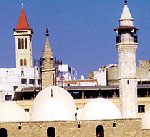“Muslims and Christians Together for Jerusalem's Sake”
Report by Lew Scudder
Jerusalem—where ‘Righteousness Reigns' (Melchi-zedek), the ‘City of David', the ‘Mother of the Church,' the ‘Mi‘raj' (transcending point) of the Muslim soul. It is the immanent icon of paradise-to-come, the New Jerusalem, where the nations are healed, creation is restored and reconciliation is accomplished. Its very soul is God himself. It is called—some might say, ironically—the ‘City of Peace.' There is a heat to the issues surrounding this city and a passion for it that are unique. It is drenched in symbolism. And beyond the proprietary claims of religion, it is a place where myth and story intersect with great force. And here all hopes for peace concentrate.
Middle eastern Christian and Muslim leaders—patriarchs, muftis, heads of communities, and other prominent spokespersons—gathered in Beirut in mid-June (14-17) to ponder these things. They sought to discover the common ground they shared and on which they might stand together to express together a vision for Jerusalem‘s future. They knew and proclaimed that holiness in that place derives not from stones of monuments and shrines but from the prayers of its people. And those prayers, raised in suffering, are for the peace of Jerusalem and the whole land of which it is the heart.
The program of the conference included plenary sessions with keynote papers. But participants also formed working groups to bring practical focus to bear upon specific dimensions of the problem of Jerusalem. It is a testament to the conference organizers—the Arab Working Group on Christian-Muslim Dialogue and the Middle East Council of Churches—that what might have turned into a swirl of disparate activity and a merely formal parade of religious pomp came together with a real sense of harmony and purpose, and achieved something tangible.
Several speakers emphasized the need for Jerusalem to be considered the capital of both Israelis and Palestinians (Patriarch Michel Sabbah of Jerusalem, most notably), and of the need to grow toward a spiritual posture in which we attain the grace to accept one another no matter what the obstacles (most eloquently expressed by Patriarch Ignatios IV Hazim of Antioch). In his address to the conference, Rev. Dr. Riad Jarjour stressed the fact that Jerusalem is the home of the three monotheistic faiths; indeed, this was a common theme running through the conference. There was a profound concern that, not only should the hard substance of current issues be aired truthfully and forcefully, but also that the door to peace be kept ajar against those who would kick it shut. It was a difficult balance to strike, and the five exhortations which come toward the end the ‘appeal' have as their principal theme that justice and support for the down-trodden is the way forward toward genuine peace. It is Jeremaic in its tone, refusing to accept those who intone “Shalom! Shalom!” for Jerusalem when, indeed, there is no “Shalom!”.
Among the nineteen actions of the conference is the ninth: “To charge the permanent secretariat of this conference with preparing and issuing invitations to a seminar focusing upon the Abrahamic heritage in order to define a position vis a vis the Zionist idea which claims a monopoly over this heritage, and claims to have established its state on the assertion of its being the Chosen People.” When this proposed initiative is followed up (as it will be), it will have the potential of opening up a difficult but necessary discussion between all parties asserting a claim in the Abrahamic tradition. By definition, it cannot exclude Jews. And it will have to focus upon a tangle of contradictory assertions of which the Zionist assertion is a key strand. If justice to Palestinians is concern, then Zionism as such must be challenged. It is not the only voice of the Jewish people which can be given a hearing.
A long-time MECC staff member, now with the World Council of Churches, Dr. Tariq Mitri, observed to ENI, “This was a gathering of religious leaders and not politicians... Their aim was to speak out forcefully and show that Christians and Muslims are united on the question of Jerusalem, and that the issue must remain on the world's agenda. The Arabic text of the appeal is the ‘language of the heart.' If listened to with a political ear, it sounds very strong.“
Mitri's point was lost upon the Israeli establishment which was annoyed by the Beirut appeal for Jerusalem. Other western commentators found that the absence of any reference to peace-advocates in Israel seriously weakened the concluding appeal of the conference. But the larger response to the appeal was favorable. The MECC is pleased that enthusiasm within Muslim and Christian circles remains undiluted, and further steps will now be taken to confirm the gains made.
First appeared in MECC NewsReport , January/February 1997 |
